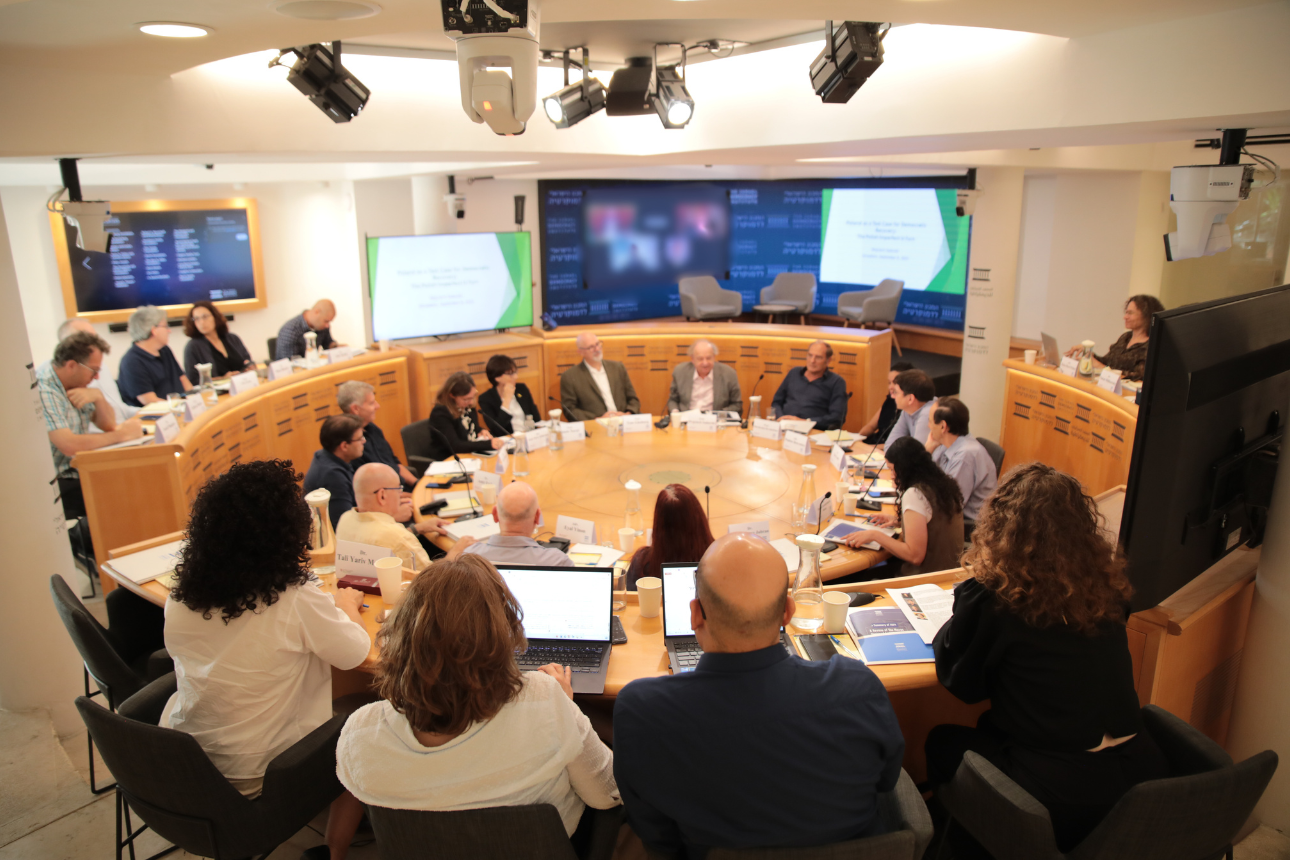Recovery and Restoration After Democratic Backsliding
Monday-Tuesday | 8-9 September 2025
The Israel Democracy Institute, 4 Pinsker St., Jerusalem

Photo: Moshe Mizrahi
The Israel Democracy Institute and the Malyi Center for the Study of Institutional and Legal Integrity, at the University of Chicago Law School hosted a two-day policy workshop with Israeli and international experts, convening to exchange ideas and lessons from countries that have experienced democratic backsliding, and, in some cases, those on the path to democratic recovery.
Alongside IDI experts, participants joined from the United States, Poland, Turkey and Israel, including, among others, Prof. Tom Ginsburg, the Faculty Director of the Malyi Center, Prof. Wojciech Sadurski, Anne Applebaum, Kim Lane Scheppele, Michael J. Feuer, former Israeli Minister of Justice Dan Meridor and former Israeli Chief Justice Dorit Beinisch (Israel).
The following are some of the key ideas and debates that came out of the conference:
Democracies that backslide do so using their own democratic institutions against them. Recovering a hollowed-out system can be even more chaotic and messy. Modern democracies generally do not fall due to coups or military takeovers – but rather populist leaders often use democracies' own institutions and work within the bounds of the law to weaken checks and balances, appoint loyalists, and eventually consolidate power in the hands of autocrats. If the opportunity arises for pro-democracy forces to restore democratic institutions, they may find these institutions to be weak, lawless and devoid of professionals to steer the ship—that is why it's critical that non-state institutions be part of the process, plans be in place and ready to go when the moment for recovery arises, and polarization be overcome for the sake of recovery.
Democratic recovery is not about going back to old systems. It's about remaking the systems with an added layer of democratic protection. The old system is what created the conditions that made democratic backsliding possible to begin with. This means advocates for democracy must address core issues of polarization and institutional failures, and have a message that is more than just anti-populism or anti-autocracy. A positive, unifying vision that frames democracy in terms of citizens' everyday lives is key. This could involve breaking out of the ordinary and taking extraordinary measures to reset the system.
Democratic recovery requires participation of institutions well beyond the three branches of government. The education system must have strong civics programs, educating children for democracy. Professional, non-partisan civil servants who were replaced by loyalists during democratic backsliding are out there in civil society, academia and the private sector—they must be engaged as part of democratic recovery. The business community also plays a key role, as economic considerations influence decision makers. Democratic restoration is a unifying project that cannot be done through hollowed out government institutions alone.
Decentralization can be a powerful tool. Just because democratic backsliding is occurring at the national level does not mean that local governments and supra-national governing entities (e.g., the EU) cannot still operate according to democratic norms and play a key role in protecting civil rights.
Constitutions are important, but they may not be a silver bullet. Constitutions serve a critical purpose in democracies of solidifying a shared vision of democratic values, protecting human rights (even when it goes against the will of the majority), and limiting government power. But some warned against overstating the value of a constitution, which may only work to the extent that leaders and the public believe in it, and against developing a constitution in the conditions of extreme polarization and even hatred. Moreover, some argued that the constraints created by a constitution can actually make democratic recovery more challenging – the laws that were easily changed as part of democratic backsliding can be more easily reversed with fewer constraints. Others argued that a constitution can strengthen the role of the judiciary in protecting democracy and that even if the face of polarization, constitutional moments are still possible.
These conversations among leading global experts helped inform the work of experts at the Israel Democracy Institute as they work to prevent the erosion of democracy in Israel and protect the institutions that make Israel a vibrant, diverse democratic and Jewish state.
